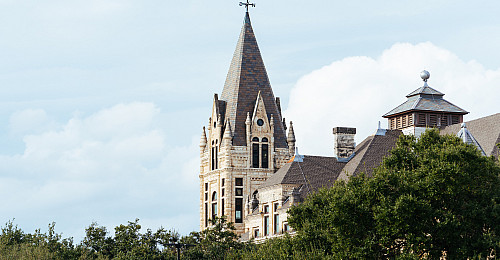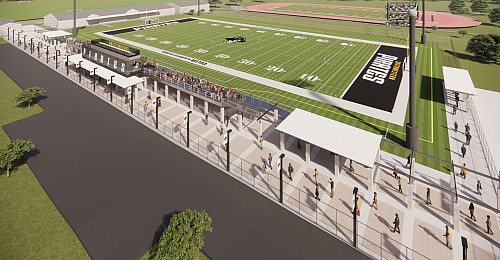Center for Career & Professional Development
Being an Intentional Creative
Michael Maine ’07 shares how his values as a socially engaged creative enrich his work experience. By Ella Massaquoi ’23
Open gallery

Ever since business grad Michael B. Maine ’07 was singled out in a course by now-retired professor of business Dr. Don Parks because he understood not only the tangible components of business concepts, but also the more intangible, philosophical ones, he knew that Southwestern would always be a place to challenge him in ways he never expected to be challenged. “I ended up really thinking about how I can use business to address social problems that business oftentimes creates,” Maine says. “If it weren’t for [Dr. Parks and Dr. Lowe, sociology professor], I don’t know that I would be doing what I do now.”
Currently, Maine is a professional photographer and creative consultant at Menrva Labs, a media production company. “I work with people around issues of social equity and social justice and help them think through how to use and create media in different ways to address those issues of equity,” he explains. From topics ranging from identity to literacy to deviance, Maine considers how images are created and how different types of media are more representative of a totality of human experiences. Tackling these topics, Maine uses his work to showcase stories that really matter.
Truer representation
At Menrva Labs, and for personal projects, Maine uses his role as professional photographer to create media representative of humans as humans, not just as “widgets in a system.” For his personal projects, Maine completes them based on things that have kept him up at night. “I’m always thinking about race, gender, sexuality, what kinds of social systems we’ve put in place to make people feel comfortable doing things, [or] not comfortable doing things, who has access to what and why, how various systems play out over generations, etc.,” he relays. It’s given him room to meditate on how social problems can be acknowledged and addressed.
The same can be said of Maine’s professional work. Needing to produce a number of images for a campaign, Maine will research what kind of images have been created before to avoid reproducing a stereotypical image. “[Oftentimes] the people look very similar, the same age, body type, hair, skin, color tones,” he says. But instead of simply featuring someone with a different body type or skin tone, Maine will reach out to the clients to get their point of view一directly asking them how they want to be represented instead of making assumptions. “I’ll ask them questions like, what makes you feel comfortable? How do you see yourself represented in the media?” he reflects, in order to bring the focus back to them as people, not simply on the media campaign.
To increase his clients’ comfort with the goal of sharing their individuality, Maine will meet a client without a camera, so they can focus on connecting as people. By the time they do the shoot, each knows enough about the other to create a truer representation of their goal. “As a photographer, I understand there are a lot of things that I come with through my own assumptions and unconscious biases, conscious biases, my own perspective, where I’m from,” Maine explains. “With all those [intersecting identities], the time we spend before [entering] the studio informs the actual image creation process.”
“Socially Engaged Creative”
Working at Menrva Labs, Maine states, “the values that I have around celebrating people for who they are as individuals [and] honoring their various intersections of identities have all been solidified.” Everyone involved is engaged, and if they aren’t accepting of one another, Maine has the range to work with or for someone who is. “I learned so much about what makes each individual person feel safe and [what] encourages them to be their authentic selves一to bring their creativity, freedom, ideas, solutions, challenges, problems, to work,” Maine relays. It taught him the difference between assuming a safe space, creating a safe space, and then maintaining that safe space, which has caused him to take on a more inclusive approach in his personal and professional life.
A phrase commonly used by Maine to describe himself一“socially engaged creative”一sums up the way in which he’s been able to maintain a safe place with his clients and collaborators. Part of his attraction to this phrase is that there isn’t a mold to confine himself to, so it leaves room for the many professional interests that he’s cultivated over time: photography, video production strategy, consulting, social justice, diversity, and inclusion. “I’m collaborating with partners to build a more socially informed approach to stuff,” he explains. This means there’s room for engaging in conversations of social justice and equity, which fits in perfectly with work both as photographer and creative consultant, since his job centers around creative problem solving, thinking, and various media outlets. Through all of his work, Maine showcases stories with an intentionality that has only grown since graduation.
Challenges vs. privileges
For Maine, the biggest challenge while navigating the workforce has been a combination of age, race, height, and personality. These factions create a unique set of challenges for him because of their intersecting identities. For most of Maine’s career, his ideas have been disregarded because he’s been younger than others. There have also been times when people will not take him seriously based on his inquisitive nature. As far as race is concerned, people have oftentimes assumed Maine is an assistant when he shows up for a photo shoot because he is Black. Though not pleasant experiences, Maine still appreciates the perspective that these instances of disrespect and marginalization gives him, because he can see how people are treating others based on assumptions.
Which brings him to the bigger systemic challenge. “We must find ways to change the systems and policies internally within the organization,” Maine states. “Then, really focus on making that entire environment as honoring and respectful of everybody involved on the team.” Working with mostly people of color and female-identified folks, Maine has seen how people will notice gender over race and what happens when that respect, or lack of respect, is assumed. It’s given him the awareness to try to create and then maintain – through his privileges – that safe space for the less privileged.
“You never just want to get stuck in the challenges,” Maine states. “I know there are [privileges] that help grant me access to institutions, placs, and people that others may not.” Mentioning things such as his gender identity, sexuality, education level, even how he dresses and speaks, Maine continues, “It’s incumbent upon me to understand where I am in any given system and how I can leverage that access, to help create more fair access to other people as well.” This understanding is important for other students from marginalized communities who graduate and enter the workforce: knowing where your strengths are as an individual can help create safe spaces for others navigating that journey as well. “Understanding what choices, what agency and autonomy do we have, where we have places of privilege,” Maine advises, “is how we can continuously improve the way we bring ourselves to the work and the way we bring that work to ourselves as well.”














